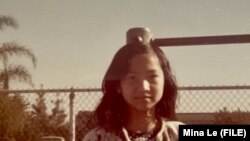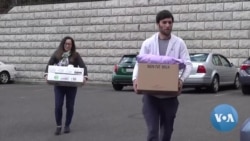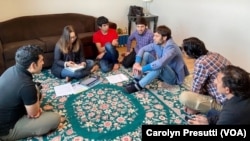ຊາວອົບພະຍົບອັຟການິສຖານເປັນຫລາຍໆພັນຄົນ ກຳລັງອາໄສຢູ່ໃນອາເມຣິກາ ໃນປັດຈຸບັນນີ້ ຊຶ່ງໄດ້ຮັບການຊ່ວຍເຫຼືອແບບຈຳກັດຈາກລັດຖະບານ. ແມ່ຍິງຫວຽດນາມຄົນນຶ່ງ ທີ່ຮູ້ດີເຖິງຄວາມຫຍຸ້ງຍາກ ໃນການສະໜອງການລ້ຽງດູຄອບຄົວຢູ່ປະເທດທີ່ບໍ່ມີຄວາມຄຸ້ນເຄີຍ ກຳລັງໃຫ້ການຊ່ວຍເຫຼືອຜູ້ທີ່ມາຢູ່ໃນນະຄອນຊີອາໂຕ, ລັດວໍຊິງຕັນໃໝ່ໆ. Carolyn Presutti ຜູ້ສື່ຂ່າວວີໂອເອ ຈະບອກໃຫ້ພວກເຮົາຮູ້ວ່າ ການຊ່ວຍເຫລືອນັ້ນເປັນແນວໃດ ຊຶ່ງບົວສະຫວັນ ມີລາຍລະອຽດເລື້ອງນີ້ ມາສະເໜີທ່ານໃນອັນດັບຕໍ່ໄປ.
ທ້າວອິສເມລ ຄານ (Ismail Khan) ກຳລັງເລືອກເຄື່ອງໃຊ້ໃຫ້ຄອບຄົວອື່ນ ທີ່ມີຄວາມຕ້ອງການການຊ່ວຍເຫລືອ.
ໂດຍເປັນອະດີດອົບພະຍົບອັຟການິສຖານ, ທ້າວອິສເມລ ຄານ (Ismail Khan) ອະທິບາຍວ່າ ລາວກຳລັງເອົາເຄື່ອງຂອງຫລາຍກ່ອງນັບແຕ່ມັນຕົ້ນ ຈົນຮອດໄປຮອດຜ້າອ້ອມ ຫລື diaper ໄປໃສ.
ທ້າວຄານເວົ້າວ່າ "ລາວເປັນແມ່ຫມ້າຍທີ່ມີລູກແປດຄົນ."
ອົງການຊ່ວຍເຫລືອການຕັ້ງຖິ່ນຖານໃໝ່ຂອງລັດຖະບານໄດ້ໃຫ້ການຊ່ວຍເຫຼືອ ໃນສິ່ງທີ່ມີຄວາມຕ້ອງການແບບພື້ນຖານ ຢູ່ໃນເບື້ອງຕົ້ນ.
ທ້າວຄານເວົ້າວ່າ: "ພໍ່ໄດ້ເສຍຊີວິດໄປໃນເຫດລະເບີດສະຫລະຊີບຄັ້ງນຶ່ງ."
ຫຼັງຈາກນັ້ນ ຜູ້ອົບພະຍົບອັຟການິສຖານຫັນໄປເພິ່ງພາໂຄງການອິດສະຫລະ ໃນລັດ ແລະໃນທ້ອງຖິ່ນ.
ນັ້ນແມ່ນເວລາ ທີ່ນາງມີນາ ເລ (Mina Le) ແລະທ້າວອິສເມລ ຄານ (Ismail Khan) ໄດ້ເຂົ້າໄປເຮັດວຽກກັບ ອົງການອັຟການິສຖານຂອງພັນທະມິດ ພູເຈດ ຊາວດ໌ ຫລື Afghans of Puget Sound Alliance.
ນາງມີນາ ເລ ເວົ້າວ່າຄອບຄົວຂອງນາງທີ່ມີ 11 ຄົນ ມາຮອດສະຫະລັດໃນ ຫຼາຍກວ່າສີ່ທົດສະວັດກ່ອນ, ຫຼັງຈາກສົງຄາມຫວຽດນາມສິ້ນສຸດລົງ.
ປັດຈຸບັນ ແມ່ນໄດ້ຫຼາຍກວ່ານຶ່ງລຸ້ນຄົນຕໍ່ມາ ນາງກໍາລັງຊ່ວຍເຫຼືອຄອບຄົວ ຂອງຊາວອັຟການິສຖານ.
ນາງມີນາ ເລ ຈາກອົງການ Afghans of Puget Sound Alliance ກ່າວວ່າ:
"ຂ້ອຍບໍ່ຮູ້ຫຍັງກ່ຽວກັບອັຟການິສຖານ - ແຕ່ແນ່ນອນ, ການລົ້ມສະຫລາຍຂອງ ກາບູລໂດຍເຫັນຮູບຂອງຄົນທີ່ຖືກຍົກຍ້າຍອອກມາໂດຍເຮືອບິນ, ມັນແມ່ນເຫດ ການແບບດຽວກັນແທ້ໆເລີຍກັບໃນປີ 1975."
ສະນັ້ນ ນາງໄດ້ມີປະສົບການໂດຍກົງໃນເວລາທີ່ໃຫ້ຄໍາປຶກສາແກ່ຄົນເຊັ່ນ ທ້າວອິສຣາ ມາສວານີ (Israr Mashwani) ທີ່ລ້ຽງດູຄອບຄົວຂອງລາວດ້ວຍການເຮັດວຽກທີ່ໄດ້ຄ່າຈ້າງຂັ້ນຕ່ໍາຢູ່ທີ່ຟາມເທເລີ (Taylor Farms).
ທ້າວມາສວານີເວົ້າວ່າ:
“ຂ້ອຍຢູ່ກັບກອງກຳລັງທະຫານພິເສດໃນອັຟການິສຖານ. ຂ້ອຍຍ້າຍມາຢູ່ໜີ້, ແລະຕອນນີ້ ຂ້ອຍເປັນຄົນຕັດຜັກ."
ກຸ່ມດັ່ງກ່າວນັ່ງຢູ່ເທິງພື້ນເຮືອນທີ່ປູຜ້າພົມສີຂຽວຂອງອັຟການິສຖານ, ໂດຍໃຫ້ຄຳປຶກສາຫາລືກ່ຽວກັບທາງເລືອກສໍາລັບຊາວອົບພະຍົບຊາຍຫ້າຄົນ ແລະເວົ້າເຖິງຄວາມຫວັງ ແລະຄວາມຝັນນຳກັນ.
ເພື່ອກ້າວໄປຂ້າງໜ້າມໃຫ້ໄດ້ວຽກທີ່ດີໄປກວ່າລະດັບເລີ່ມຕົ້ນເຫຼົ່ານີ້, ອົງການ ພັນທະມິດໄດ້ລົງທະບຽນຊາວອັຟການິສຖານເຂົ້າຮຽນໃນຫ້ອງຮຽນພາສາ ອັງ ກິດ, ຈາກນັ້ນກໍກ້າວໄປສູ່ການຢັ້ງຢືນທັກສະ ທີ່ເຂົາເຈົ້າມີມານຳ ແຕ່ອັຟການິສຖານ. ເຂົາເຈົ້າເຮັດວຽກກັບພວກພໍ່ຄ້າຂາຍເຄື່ອງໃນທ້ອງຖິ່ນ…
… ເຊັ່ນທ່ານຊາເຢດ ເບສແມລລາ ຣາຊາວີ (Sayed Besmellah Razavi) ຜູ້ທີ່ຈ້າງອະດີດຜູ້ບັນຊາການກອງພັນໃຫຍ່ຂອງອັຟການິສຖານ ແລະເຈົ້າໜ້າທີ່ສືບລັບເພື່ອຢາຍສິນຄ້າ ໃສ່ຮ້ານວາງເຄື່ອງຂອງຕົນ.
ທ່ານຣາຊາວີ (Razavi), ເຈົ້າຂອງຮ້ານທີ່ຊື່ວ່າຕະຫຼາດ 786 ກ່າວວ່າ:
"ພວກເຮົາຝຶກອົບຮົມເຂົາເຈົ້າ, ບອກເຂົາເຈົ້າວ່າ ເຮີ້ຍ ພວກເຈົ້າຕ້ອງ ມາການໃຫ້ທັນເວລາ, ແລະເຈົ້າຈະຕ້ອງພັກຜ່ອນ."
ຊາວອົບພະຍົບອັຟການິສຖານ 3 ພັນຄົນ ໃນປັດຈຸບັນອາໄສຢູ່ໃນລັດວໍຊິງຕັນ, ຫຼາຍຄົນແມ່ນຖືກຮັບເຂົ້າມາປະເທດພາຍໃຕ້ກົດຫມາຍທີ່ອະນຸຍາດໃຫ້ມີສະຖາ ນະພາບແບບມີການຍົກເວັ້ນທາງມະນຸດສະທໍາ, ແຕ່ເຂົາເຈົ້າບໍ່ມີເງື່ອນໄຂເໝາະສົມ ທີ່ຈະໄດ້ສະຖານະພາບຂອງຜູ້ຢູ່ອາໄສຖາວອນຊຶ່ງເຮັດໃຫ້ອະນາຄົດ ຂອງເຂົາເຈົ້າຕົກຢູ່ໃນສະພາບທີ່ບໍ່ແນ່ນອນ. ນິຕິກຳຂອງລັດຖະສະພາທີ່ສາມາດຊ່ວຍໃຫ້ເຂົາເຈົ້າໄດ້ — ແມ່ນຖືກໂຈະໄວ້.
ທ້າວຄານ ຈາກອົງການ Afghans of Puget Sound Alliance ກ່າວວ່າ:
"ຖ້າພວກເພິ່ນບໍ່ຮັບຮອງເອົາມັນ ໃນອີກປະມານປີນຶ່ງ ເຈົ້າຈະເຫັນວ່າ ຫຼາຍ ຄົນກາຍເປັນຄົນທີ່ບໍ່ມີບ່ອນຢູ່ອາໄສ."
ບ່ອນໃດທີ່ມີອົງການພັນທະມິດພົບໄປຄົນ ບ່ອນນັ້ນກໍຈະມີເດັກນ້ອຍໄປຟັງ ຫຼື ຫຼິ້ນຢູ່ໃກ້ໆ. ບູລິມະສິດອັນນຶ່ງຂອງເຂົາເຈົ້າ ກໍແມ່ນຊ່ວຍເຂົາເຈົ້າລົງທະບຽນ ເຂົ້າໂຮງຮຽນ ແຕ່ວ່າອຸປະສັກດ້ານພາສາ ແມ່ນສູງຫລາຍ. ດັ່ງດຽວກັນກັບ ຕອນທີ່ເດັກນ້ອຍອາຍຸ 13 ປີ ຍ່າງໄປໂຮງຮຽນສອງມື້ລຽນຕິດກັນ ແຕ່ບໍ່ຮູ້ວ່າ ເປັນຫຍັງຫ້ອງຮຽນຈຶ່ງຫວ່າງເປົ່າ. ນັກຮຽນພາກັນໄປພັກ.
ຈຳແມ່ຫມ້າຍຄົ້ນນັ້ນໄດ້ບໍ່? ລູກຂອງລາວ 8 ຄົນທີ່ມີອາຍຸຮອດ 16 ປີບໍ່ມີຜູ້ໃດ ເລີຍທີ່ໄດ້ເຂົ້າໂຮງຮຽນຢູ່ໃນອັຟການິສຖານ. ເຂົາເຈົ້າບໍ່ຮູ້ອ່ານໜັງສື. ພຽງແຕ່ບໍ່ເທົ່າໃດມື້ ຫຼັງຈາກເຄື່ອງຮຽນເຫຼົ່ານີ້ສົ່ງໄປຮອດ ເຂົາເຈົ້າກໍໄດ້ຍ່າງເຂົ້າໄປໃນຫ້ອງຮຽນຂອງສະຫະລັດເປັນຄັ້ງທໍາອິດ.
ອ່ານຂ່າວນີ້ເພີ້ມເປັນພາສາອັງກິດຢູ່ຂ້າງລຸ່ມນີ້:
Thousands of Afghan refugees are now living in America, struggling after receiving limited government assistance. One Vietnamese woman who knows the challenge of providing for a family in an unfamiliar country is helping the new arrivals in Seattle, Washington. VOA’s Carolyn Presutti shows us how.
Ismail Khan chooses supplies for another family in need.
Former Afghan refugee Ismail Khan explains where he’s carrying these many boxes of supplies --- from potato chips to diapers.
“She is a widow with eight kids.”
Government resettling agencies provide direct assistance with the basics, at first.
“The dad died in a suicide bomb.”
Then Afghan evacuees turn to state and local independent programs.
That’s when Mina Le and Ismail Khan step in with the Afghans of Puget Sound Alliance.
Mina Le: Le’s family of 11 arrived in the United States more than four decades ago, after the end of the Vietnam War.
Now, more than a generation later, she’s helping Afghan families.
Mina Le, Afghans of Puget Sound Alliance:
“I knew nothing about Afghanistan — but of course, the fall of Kabul with the pictures of the people being evacuated through airplanes, it was exactly the scene in 1975.”
So, she has firsthand experience when counseling people like Israr Mashwani, who is supporting his family with a minimum wage job at Taylor Farms.
“I was with the Special Forces in Afghanistan. I moved here, and now I'm cutting vegetables.”
The group sits on the floor on a green Afghan carpet, discussing options for five male refugees and sharing hopes and dreams.
To move beyond these entry-level jobs, the alliance enrolls Afghans in English classes, then toward certifications in the skills they brought from Afghanistan. They work with local merchants …
… like Sayed Besmellah Razavi, who has hired former Afghan brigade commanders and intelligence officers to stack his shelves
Sayed Besmellah Razavi, 786 Market Owner:
“We train them that, hey, you have to come on time, and you will have to take breaks.”
Three thousand Afghan refugees now live in Washington state, many admitted under a law permitting humanitarian parole status, but they don’t qualify for permanent residency, leaving their future in limbo. Congressional legislation that could help them — is stalled.
Ismail Khan, Afghans of Puget Sound Alliance:
“If they don’t pass it in a year or so, you will see many will be homeless.”
Wherever the Alliance meets, there are children listening or playing nearby. One of their priorities is to enroll them in school, but language barriers are steep. Like when a 13-year-old walked to his school two days in a row, not knowing why classes were empty. The students were on break.
The Alliance also helps get Afghan children into school — but language barriers are steep. Like when a 13-year-old walked to his school two days in a row, wondering why the classrooms were empty. The students were on break.
Remember the widow? None of her eight children up to the age of 16 ever attended school in Afghanistan. They can’t read. Just days after these supplies were delivered, they walked into a US classroom for the very first time.








